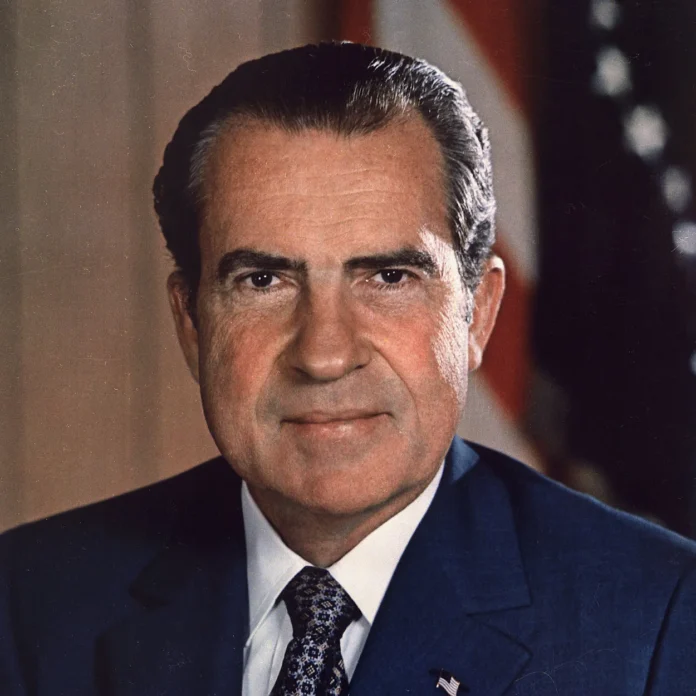Richard Nixon, the 37th President of the United States, served from 1969 until his resignation in 1974, making him the only U.S. president to resign from office. Born on January 9, 1913, in Yorba Linda, California, Nixon’s early life was marked by his Quaker upbringing, which instilled values of hard work and perseverance.
However, Nixon’s presidency was overshadowed by the Watergate scandal, which involved a break-in at the Democratic National Committee headquarters and subsequent cover-up efforts by his administration. The scandal ultimately led to his resignation on August 8, 1974, to avoid impeachment.
Interesting Facts About Richard Nixon
- Quaker Upbringing: Nixon was raised in a Quaker household, which instilled in him values of simplicity and honesty. He attended Quaker meetings regularly as a child and went to Whittier College, a Quaker institution
- World War II Veteran: Contrary to what might be expected from a Quaker, Nixon enlisted in the Navy during WWII instead of claiming a draft exemption. He served as a Lieutenant Junior Grade and was recognized with a Navy Letter of Commendation for his service
- Possible Assassination Plot: Lee Harvey Oswald, who later assassinated John F. Kennedy, reportedly expressed a desire to kill Nixon before the Kennedy assassination
- Unique Middle Name: Nixon’s middle name, “Milhous,” comes from his mother’s maiden name, reflecting his family’s heritage
- Theater Connection: Nixon met his future wife, Pat, while auditioning for a community theater play, leading to their eventual marriage in 1940
- Musical Talent: Nixon was proficient in five musical instruments, including the piano, saxophone, and clarinet, which he used to enhance his public image
- Bowling Enthusiast: During his presidency, he enjoyed bowling and even had a one-lane bowling alley built in the White House
- Royal Ancestry?: Nixon reportedly had ancestry linked to King Edward III of England, although this connection is not definitively proven
- Student Politics: Despite being president of his eighth-grade class, Nixon lost a bid for student-body president in high school, marking one of his early political setbacks
- Football Fan: A keen football fan, Nixon played on his college team and maintained a friendship with the Washington Redskins’ coach, suggesting plays during games
- Failed Business Venture: Before his political career, Nixon co-founded a company to produce frozen orange juice, but the venture failed within 18 months
- Ending the Vietnam War: Nixon campaigned on the promise to end the Vietnam War, which had dragged on for over a decade. His administration initiated a gradual withdrawal of U.S. troops, culminating in a peace treaty signed in January 1973
- Watergate Scandal: Nixon’s presidency is perhaps most infamously marked by the Watergate scandal, which began with a break-in at the Democratic National Committee headquarters. The subsequent cover-up led to Nixon becoming the first U.S. president to resign from office in August 1974
- Time Magazine’s Man of the Year: He was named Time magazine’s “Man of the Year” in both 1971 and 1972, recognized for his diplomatic efforts with China and the Soviet Union
- Political Comebacks: After losing the 1960 presidential election to John F. Kennedy, Nixon made a successful comeback, winning the presidency in 1968 and again in 1972
- Presidential Resignation: In August 1974, faced with likely impeachment over the Watergate scandal, Nixon resigned from the presidency, making him the only U.S. president to do so
- Cultural Impact: Nixon was the first sitting president to visit China in 1972, significantly changing U.S.-China relations and opening diplomatic ties
- Unique White House Features: Nixon had a bowling alley built in the White House, showcasing his love for the sport. He was known to enjoy playing bowling during his leisure time
- Celebrity Connections: Nixon had a notable connection with Elvis Presley, who famously requested a meeting with him to discuss drug abuse, leading to Nixon designating Elvis as a federal agent in the war on drugs
